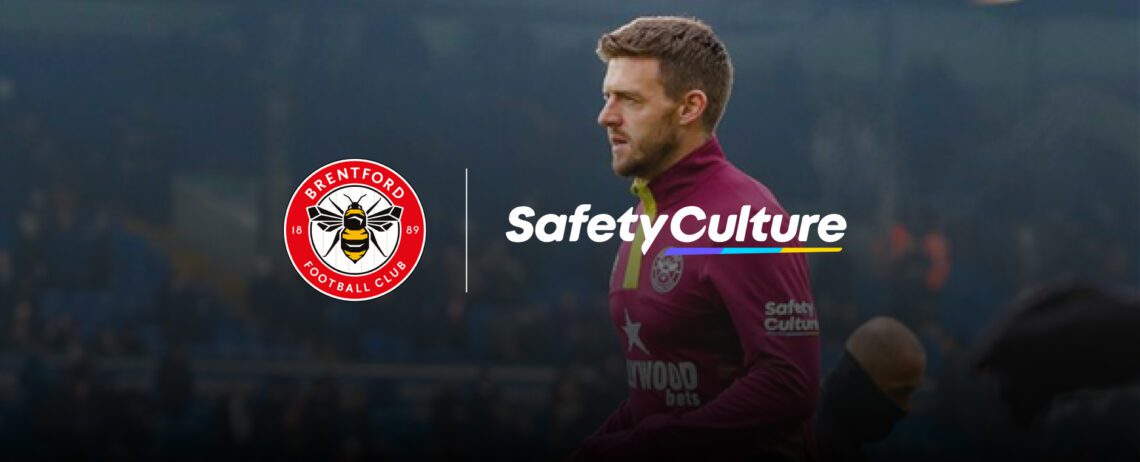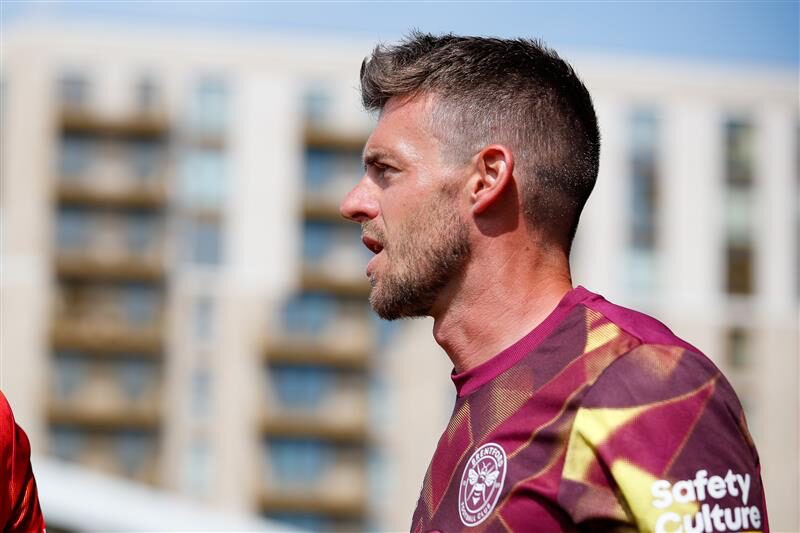Moments that Matter with Chris Haslam from Brentford Football Club
Moments That Matter | By | 28 Sep 2023 | 9 minute read

Chris Haslam is a lifer at Brentford Football Club. He shapes players to be at their best in his role as the Bees’ Head of Athletic Performance. We sat down with Chris to talk about Moments that Matter and find out what goes into this Premier League team’s growing success.
Take us through a typical day for Brentford FC’s Head of Athletic Performance.
There’s a multitude of factors that go into heading up the performance team. I’m heavily involved in both the coaching and the performance sides – then linking everything with medical and the players. Basically, I broadly sit across a lot of departments and bring everything across to the coaching staff and Head Coach Thomas Frank.
We’ve got a pretty big team now – that’s inclusive of everything from strength coaches to physical coaches, reconditioning coaches, sports scientists, nutritionists psychologists, and a sleep and wellbeing consultant. I’ll also have input and involvement with the operations and logistics team.
Our ultimate focus is on the players performing for that game – but also over a period of time, whether that be a month or a season and so forth. I try to be across a lot of areas, whether that’s planning, pre-season, and the physical fitness for the players.
Here at SafetyCulture, we believe in fostering a culture of improvement. Do you have a recipe for improving the performance of an athlete?
In my 14 years working in the performance space, I’ve come to realize it’s the big fundamental things that you need to focus on. A lot of people get sidetracked by small details, but we try and focus on doing the big things – the fundamentals – really well. I believe if you do these big things well, and do them better than anyone else, they carry so much more weight.
I see the big fundamental things as ‘big rocks’. So you get the big rocks into the jar first to make the most progress, then you can fill them up with smaller pebbles, followed by sand. That’s the philosophy that we have at Brentford because if you get those things right, then you’ve got the foundation and you can build from there.

Tackle the big ‘big rocks’ first. Love that! What goes into an ideal training session?
The big thing for me is strategic planning. Because if you get the plans and structure right, everything else falls into place pretty well. We have detailed planning around what the training session will look like from a tactical, technical, and physical perspective. Then we integrate all those elements together. Ultimately, we truly believe that if we train well through the planning and structure, with the principles (i.e. the ‘big rocks’) that we have as a club, we’ll have really meaningful and good results.
This results in the players being well-drilled, physically able, and capable of delivering the style of play. Then we’ll get success and a positive outcome over a period of time. This planning and preparation also means we don’t waste any time in the training session.
Every single player in the squad has a coach and a performance staff member assigned to them. We’ll set targets, plans, and development plans for them. We’ve got a seasonal plan that’s broken down into six months, that’s broken down into six weeks, then we review it at the end of six weeks. It’s a really good way for coaching staff, performance staff, and a player to build a closer relationship – that’s something Brentford does really well.
Apart from physical fitness, what other factors come into ensuring a player performs at their best?
Sure, it’s important for them to make sure they maintain their physical fitness. But more important are sleep and nutrition – they’re the absolute go-to for the players to do well.
Recovery in terms of ice baths, cryotherapy, yoga, and meditation are all part of it, but if you’re not sleeping or eating well, then you’re missing the key areas of real performance. So our go-to for optimum recovery centers back to sleep and nutrition – everything else is around that.
How do you motivate the players to show up and be the best versions of themselves?
This is something we focus on big time as a club. We make sure that players come in every single day, and that they want to be a better version of themselves. That means from the warm-up and preparation, they’re on their game.
If you go into your workplace every single day, hungry, excited, and feel value and purpose, then it makes you better, and that’s what we try and do at the club. You’ll be amazed at how many clubs lose sight of that, and players don’t go in with joy and excitement and want to train and be better. We have that in abundance at Brentford.
That trickles down to performance because we really, really want people to be happy, and we want people to want to be better every day. And if we can achieve those things, then we get a positive outcome.
“If you go into your workplace every single day, hungry, excited and feel value and purpose, then it makes you better and that’s what we try and do at the club.”
Chris Haslam, Head of Athletic Performance, Brentford Football Club
How do you foster that mentality in the players, and put them in the mindset of continuous improvement?
We strive to make our people feel valued and purposeful. Sometimes that’s hard for players. If you’re a regular starter on the pitch, you know you’ve got a purpose. But for the guys who are on the fringes, we need to make sure they feel valued as well.
Making sure training sessions are bespoke for them is something we try to consider. We try to give honest feedback so they know what they need to work on to play. Then ultimately, if they’re achieving, then it’s going to get them much closer to the team.
What are some of the biggest challenges you have working with professional athletes?
Ultimately, they need to perform. There’s been a real shift in the years I’ve worked in football. In years gone by, it was more of a hobby. Today, players just want to be as good as they can be. There’s so much investment in their own careers, which then means there’s so much pressure on them.
It’s down to the manager or the coaching staff to decide if they’re going to play or not. So trying to keep everyone feeling like they’re valued is a tricky thing to do. Especially when you’re working with a team where only 11 people can start.
The other kind of challenge is that we’re still a small club in the Premier League, and we have to keep believing that we deserve to compete, yet not lose sight of where we’ve come from.
So if at any point we think that we’ve cracked the Premier League, we need to be aware of ‘mission creep’. Little habits where players or staff might turn up late or start to leave earlier or whatever it may be.
Thankfully, we’ve got a really good culture where we don’t have that. But that’s stuff we need to be alert on, that we don’t lose sight of the basics, whether it’s turning up on time, training well, doing your gym well, eating and sleeping. Premier League is a big industry, so we need to make sure that we keep the focus on both staff and players.

How do you deliver feedback after a game so the players can get better over time?
We’ll have a debrief of the game as a team and as coaching staff. So we’ve just played Newcastle, for example. We’ll have a meeting to review the clips of the game and have an open discussion, then we put that down into a presentation to the players to get as much feedback as possible. We want the players to also have an impact and give input.
But also, when we’re looking ahead to playing our next game – we’ve got Everton on Saturday – we’ll have big group meetings where we’ll discuss game plan strategy, areas where we can be successful, and things we need to be aware of.
Then we’ll do an offensive review as smaller groups, so we could have offensive players or defensive players. We find that when you’re in groups of five or six, plus a couple of staff members, you can have really meaningful conversations.
Then we’ll use clips from both the game and the training sessions so we all understand what we’re trying to achieve.
How do you navigate challenges that happen off the field that could affect player performance?
Often, if a player is not performing, it’s not because they’ve forgotten how to kick the ball; it’s because there’s stuff going on in their life. So we try to emphasize the holistic side and the personal side, and we’ll feed that back into us.
One of the coaching staff was out for dinner with one of the players last week to build that connection. I think those situations are invaluable, and that’s one of the unique things about our club. When you have good relationships with players, you can be honest. So if they’re not performing for whatever reason, you can ask them and find out why, and they’ll be more honest and vocal back.
You’re hiring athletes for their individual talents. How do you make that all come together as one successful team?
It’s impossible to measure, but we have got one of the best team cohesions and a sense of togetherness. We’re lucky we’ve got such a close group, and that’s players and staff. I think it’s honestly one of the big reasons we’re successful.
When new players come in, they come into our culture, they come into our group, and they have to conform to it. For example, every single Brentford player goes to the gym together. Now, that might sound simple, but in other clubs, there’s like a 50% gym compliance. New players might not be used to that, but they conform to it because those are the standards we set, and they want to feel like a part of the team.
We’ve just got Neal Maupay back in, who was at the club before, and he’s just so happy. He just says it feels like coming home for him, and it’s because he’s been at other places where it’s not been as cohesive. I think when players come in and they feel valued, they feel appreciated, they feel the trust, then they want to give back as well. So I think that’s a big part of what we have, and it happens organically.
What about when recruiting for new players. What goes into consideration to keep this team cohesion going strong?
Our recruitment team makes sure we get the right characters in to build the culture and not take it away. Over time, we try to build these ‘culture architects’ – and that’s both in the playing staff and the coaching staff – guys who drive the culture. It’s a big thing we do, and I don’t think we’ve nailed it and got it perfect, but we try to make sure these guys take ownership and lead as an example.
We had Pontus Jansson, who was with us for a long time. He came in very anxious and under a lot of pressure being a higher profile player. So we tried to support him in that, and he now looks back at his progress, and he’s like, “I’m a completely different person.” Now it’s down to Christian Nørgaard, who’s come up as our captain, to then carry that stuff on and take it to his own new level. Building good culture stems from good people, good players, good staff, and I think that helps.
Have you always used this framework of finding ‘culture architects’ as your North Star when building a team?
No, it’s changed. If I go back a few years, when we recruited players, Brentford was the place to come in, develop, and use as a stepping stone to move on. We were quite honest about that because we understood where we were. Our strategy back then was to buy players for £2 million and then sell them for £33 million, which we did with Ollie Watkins.
There’s been a shift in more recent years where, yes, players can still come in, develop, and move on if they’re successful. But now the other option is to stay and be part of making Brentford a sustainable Premier League team. Pushing on for bigger and greater things is something we’re trying to do from the staff side.
The ambition is to finish as high as possible. We don’t just want to ‘survive’ in the Premier League. We want to try and finish as high as possible. It’s this positive outlook and mindset that we try and create.
“The ambition is to finish as high as possible. We don’t just want to ‘survive’ in the Premier League. We want to try and finish as high as possible. It’s this positive outlook and mindset that we try and create.”
Chris Haslam, Head of Athletic Performance, Brentford Football Club
Injuries and setbacks are a part of professional football. How do you help players stay strong when they’re facing injury?
Unfortunately, it can be a rubbish industry at times because you go from doing something you love every single day, then as quick as that, it’s taken away from you. When a player is injured, we try to set progressive targets and goals to get them back as quickly and safely as possible. That way, they can celebrate success incrementally to motivate them to keep going.
Something we’ve done wrong in the past is when players get injured, they’re not coming in to train, or they come in later, then they’ll just sleep in or go to bed later, and they’ve completely lost their rhythm. We’ve now progressed around trying to get the players in at similar times. One: to keep their routine; and two: to keep that connection with the team.
It’s rubbish when you’re injured, but if you can have that social interaction for a period of time, then it makes you feel a little bit better. There’s no one-size-fits-all. Certain players hate being around it when they’re injured. So we try to engage them in and stimulate them with different activities. Whether that’s going to different environments – watching a different sport or learning a different language, we try to think about the holistic person with the aim they come back a better version of themselves.
In light of continuous improvement, what’s your measure of success?
There’s the on-pitch kind of growth and development. But we try to support these players and staff to be better versions of themselves as a whole. I like to see them learn to tolerate different things, grow as a leader, grow as a person, have a family – whatever it might be. We truly believe if they’re well-balanced off the pitch, then they’ll perform better on the pitch. If we can develop good people during their time at Brentford, then that is what success is. It’s nice to know you’ve been a small part of their journey to progress and develop to where they are and know that you’ve made a huge impact in their life.
Learn more about Brentford Football Club
- Brentford FC customer story
- Sporting highlights from our Brentford Bootcamp
- WATCH: How Brentford FC uses Issues to create the best match-day experience
Important Notice
The information contained in this article is general in nature and you should consider whether the information is appropriate to your specific needs. Legal and other matters referred to in this article are based on our interpretation of laws existing at the time and should not be relied on in place of professional advice. We are not responsible for the content of any site owned by a third party that may be linked to this article. SafetyCulture disclaims all liability (except for any liability which by law cannot be excluded) for any error, inaccuracy, or omission from the information contained in this article, any site linked to this article, and any loss or damage suffered by any person directly or indirectly through relying on this information.





